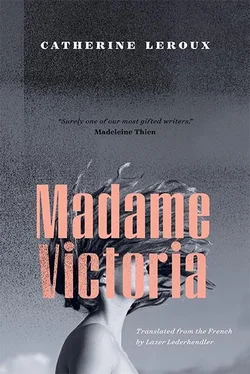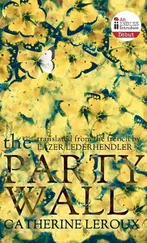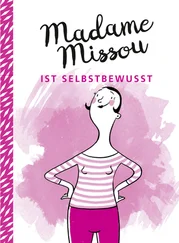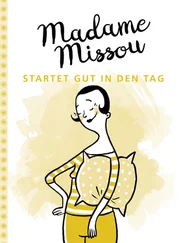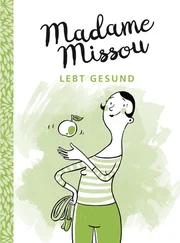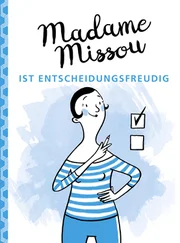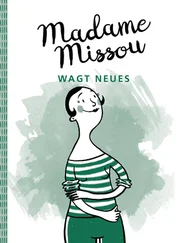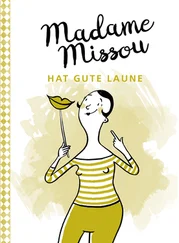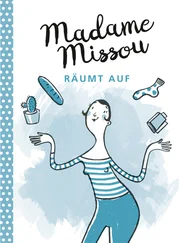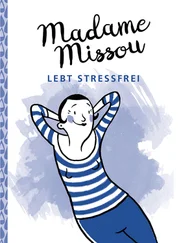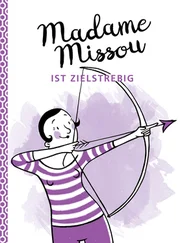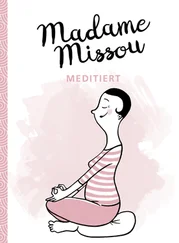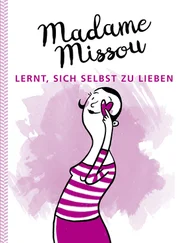She made her way to the exit without getting lost, as if she had memorized the maze of the hospital’s geography. Waiting for her at the other end of the parking lot was a wood. The hill she had chosen overlooked the buildings where a small menagerie bustled in the midst of disease, where human beings stooped over the unwell, where newborns wriggled in the arms of their parents, where family members held each other close and their tears intermingled. She hurried. The holes, the abscesses, the varicose veins, and the lesions were flaring up inside her.
At the foot of the knoll she cast aside her walker. The slope was steep and climbing it took an inordinate amount of time, but Victoria made it to the top as if out of habit. Breathless, she leaned her back against a young birch. The city was spread out at her feet: the roofs and facades that enclosed her former office, the rooms where she had slept opaquely through many nights, the college and, beyond the river, the muddy lands that had witnessed her birth—a landscape she could no longer fathom. For the place where logic and ambition had been in command was now occupied by a dizzy sense of fullness. Placing her hand on her chest, Victoria coughed and felt a hundred vesicles burst in the depths of her throat.
She groped inside her jacket for the flask that had followed her everywhere for the past twenty years. When she lifted the container to her ear and shook it she heard the chime of molten gold. It seemed like rain was splashing down around her, yet she remained dry. An uncommon tenderness washed over her heart and the back of her head. Her vision grew blurry.
Below, the city still throbbed, but Victoria no longer saw it. Her world sat in the palm of her hand. She had retained her primordial thirst, and now it was almost quenched—a feeling of having at once lost and conquered and, especially, of being precisely where she ought to be. Her fingers uncorked the flask. The redolence rose from her Eon Special Reserve like claws lashing out, and the too-sudden joy made her knees buckle. She filled her chest with a final breath of air and turned her face to the sky; ready now for the last triumph, she locked her lips around the mouth of the bottle. She thought she heard a gong ring out somewhere. She drank.
Victoria on Borrowed Time
IBELIEVE WE DIDN’T quite know why we wanted to die. At that age, more than at any other time of life, you want to love, kill, come, suffer, but you don’t know why. You react to one desire by responding to another; you try to quench your thirst by lighting a fire, to heal a wound by thrusting your finger into it. I believe we wanted to die of love, which was very silly and at the same time surprisingly clear-sighted for adolescents. How were we to know that if we’d let our passion run its course it would have dissolved after a few years and given way to the humdrum disappointment that unites old couples? We had no idea what lay ahead, yet we wanted to avoid it. Our sadness had sharpened us like arrowheads and we were pointed north. Toward the mine.
He died and I lived, whereas the opposite should have happened. For a long time I thought I was the one who had corrupted him. With no childhood to speak of and no family except those assigned to me by the government, I had never learned to hope. But I had the trills and the alders of the grove, and the purl of the river. I suppose that’s what enabled me to bide my time until I met him. He came from another place, from a house as yellow as a Sunday morning egg yolk, as warm as the smell of roasted chicken.
It started in history class, the worst course of all. We were told about the Inquisition, the witches burned at the stake, the African slave trade, the massacre of the American indigenous peoples, the Holocaust. All those horrors coated with a neutral varnish by the Department of Education. Sitting at the desk next to mine, Daniel began to cry while the teacher blithely recounted the death of the last Inca emperor. He wept so softly that it was the tiny plash of his tears on his textbook that caught my attention. The next day I sat down beside him on the bus. He was thin and handsome, he had eyes of different colours, and his hair was dyed the dark shade worn by all unhappy boys. I took his hand in mine and held on to it after that.
We touched each other with the dread and awe once reserved for dragons and horses. He knelt before my bereavements and nightmares and transformed them into small pyres that refused to burn. I kissed every joint, every knot of his frail body, every blow received at random in schoolyards and vacant lots. He fashioned miniature clay figurines meant to reshape my life story and make me into a heroine, and in a hushed voice composed little melodies that I would learn by heart. I’ve never met anyone else with that kind of imagination and the knack for pouring it into such small forms.
His parents liked me. They would probably have liked anyone interested in spending so much time with their son. I also believe that they pitied me to some extent. And, above all, that they were decent people. I was at their house all the time. After school, for homework. Before supper, to watch the stupid TV shows. Spaghetti on Monday, hamburgers on Friday. Weekend chores that wore us out, with Mr. Borduas cheering us on and laughing at our contorted faces; Christmas holidays with Mrs. Borduas insisting we sing carols in front of the tree. The citrus smell of their car at 10:30 p.m., when they drove me back to the hard-angled house that I was never able to consider my home.
When we turned sixteen, the Borduas decided it was acceptable for me to sleep over, in the same room as their son. If this permission had never been given, things might have gone in a different direction. Our adolescent angst eventually would have subsided. But as is often the case for the sick and the reckless, the night changed everything. Now we could talk for hours on end about the reasons why we thought the human race was doomed, a horrible accident in the history of the world. Under the heavy quilt of his bed, we learned to articulate, dissect, and magnify our despair so that it grew into a creature more solid than ourselves.
We began our last year in high school constantly sleep-deprived, which made us as brittle as dry bread. It was time to make decisions, choose a career, plan our lives—the sort of process that seemed to unfold in a foreign language, according to an indecipherable code. We refused to fill out the forms, to take the tests that were supposed to guide us toward the fields that suited us best, and soon our boycott extended to schoolwork in general. We had no wish to do anything anymore except to be together in his bed, welded into an unintelligible ball, rejecting whatever was not our love.
What happened next should come as no surprise to anyone. That sort of pact was already unexceptional at the time. To realize now how ordinary our situation really was is almost worse than having nurtured such suffering, than surviving the death of the person I loved. To realize that the feelings we thought we were the first to discover were in fact shared by thousands of other teenagers who were too fond of Kurt Cobain or Émile Nelligan or knives.
Some cities have a bridge or a railroad where the trains shoot past. In our town there was the mine. An open pit so massive it took your breath away, long abandoned by the company that had dug it and guarded by derelict fences full of gaps made by curious locals, explorers, or just plain fools looking for a place to get high. As for us, we hung out there to get better acquainted with the void. We would sit down at the edge of the precipice with our stomachs in knots, and our dizziness would get mixed up with the pounding of our hearts. It was the ideal spot to kill yourself.
Читать дальше
